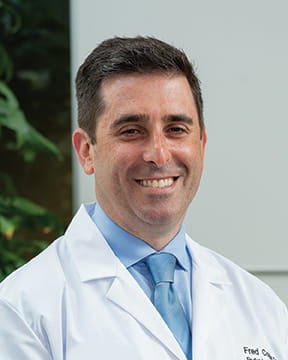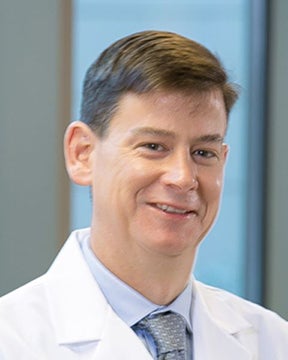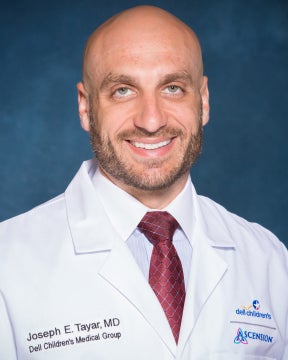Cystic Fibrosis Clinic at Dell Children's
The Cystic Fibrosis Clinic at Dell Children’s Medical Center at Ascension Seton delivers the latest in care for children and young adults with cystic fibrosis (CF) in Central Texas. As an accredited pediatric and adult center for care by the Cystic Fibrosis Foundation, our highly experienced doctors and care teams diagnose, treat and help manage cystic fibrosis from infancy into adulthood. And, we help young adults make a seamless transition into care at Ascension Seton.
When you choose Dell Children’s, you have a multispecialty team dedicated to your child’s care. Every appointment starts with a compassionate conversation and discussion to make sure the care plan and therapies are working well. Our clinic brings together an experienced team of pediatric pulmonologists, gastroenterologists (GI), respiratory therapists, physical therapists, dietitians, pharmacists, genetic counselors, psychologists, social workers, child life specialists and a dedicated nurse coordinator.
CF is an inherited chronic disease that affects the lungs and digestive system. Having a child diagnosed with cystic fibrosis or being diagnosed with it as an adult may feel overwhelming. The Cystic Fibrosis Care Clinic brings together a multispecialty team to deliver compassionate care for your child. We focus on helping your child and family learn as much as possible about daily care and how to manage this disease, so you have a care plan that is right for you.
Diagnosing cystic fibrosis in infants and children
Early diagnosis of CF helps your child begin the treatment they need more quickly. Prenatal genetic testing for cystic fibrosis may be done before your baby is born. Once your baby is born, newborn screening for CF is done in the first few days and before your baby leaves the hospital. The results of a newborn screening might not mean your child has cystic fibrosis, but they may show that your child needs to have further testing. A sweat test is used to diagnose cystic fibrosis. Genetic testing may also be recommended in follow-up.
If your child is suspected of having or is diagnosed with CF, talk to your pediatrician about referring your child to the Cystic Fibrosis Clinic at Dell Children’s. Our care team takes the time to explain your child’s diagnosis and answer your questions. Then, we create a care plan that’s right for your child.
Advanced care for cystic fibrosis
 Specialists at Dell Children's have the expertise to manage CF using some of the latest therapies. Many care plans include respiratory therapy, medications and specialized diets – every care plan is customized for the individual child. Children with cystic fibrosis need to meet with all of their specialists at least four times a year. When your child comes in for their quarterly visit, they may see all of their specialists – including their pulmonologists, respiratory therapist, gastroenterologist, dietitian, social worker and physical therapist – in the same visit. We work together as a team and adjust the care plan over time as needed.
Specialists at Dell Children's have the expertise to manage CF using some of the latest therapies. Many care plans include respiratory therapy, medications and specialized diets – every care plan is customized for the individual child. Children with cystic fibrosis need to meet with all of their specialists at least four times a year. When your child comes in for their quarterly visit, they may see all of their specialists – including their pulmonologists, respiratory therapist, gastroenterologist, dietitian, social worker and physical therapist – in the same visit. We work together as a team and adjust the care plan over time as needed.
Medications: There are many different medications that may be used to treat CF. At Dell Children’s, we prescribe some of the latest medications that can be used to help improve breathing and lung function, thin and loosen mucus, fight infection and more.
Clinical trials: Clinical research studies may provide more options for advanced treatment. At the Cystic Fibrosis Clinic at Dell Children’s, your child has access to some of the latest clinical trials available. Talk with your child’s doctor if you have questions about clinical trials.
Respiratory therapy: Respiratory therapists who specialize in cystic fibrosis help children with breathing and airway clearing techniques. These techniques can help loosen mucus, which can improve breathing and reduce the risk of infections.
Nutritional care: Children with CF need more energy in order to breathe normally and to help prevent lung infection. CF can also cause digestion problems. Because of this, children with CF often need to consume more calories. Dietitians at Dell Children’s create specialized nutrition plans to help children meet all their dietary needs.
Multidisciplinary care teams
When your child has a complex condition like CF, they can benefit from having a multispecialty team:
- Convenience of meeting with multiple specialists in one visit.
- Close collaboration between your child’s team of specialists, which allows for the development of an individualized and comprehensive treatment plan.
- Doctors who participate in the latest research on CF and who meet regularly to discuss treatment plans.
Supportive care for your child and family
Pediatric psychologists, social workers and child life specialists are part of your child’s care team at Dell Children’s. These specialists are experienced in helping children cope, manage fears, stress and other challenges they may face when having a chronic illness. Our specialists meet with your child and family and work with you to create a care plan that supports your child’s emotional health. We also connect you with resources in the community and support groups.
Helping your teen transition into adult care at Ascension Seton
At Dell Children’s and Ascension Seton, we make the transition into the adult care setting as smooth as possible for young adults. Up to a year before they transition out of pediatric care, families can tour the Cystic Fibrosis Clinic at Ascension Seton and meet their new care team. Before the transition, pediatric care teams encourage as much independence as possible in patients, taking the time to explain their medications, dosage, and therapies. Pediatric specialists work with the adult specialists as one care team – helping ease the transition of care.
Meet our pediatric care team
Fred Coste, MD
Pediatric Pulmonology
Pediatric Pulmonology
Pediatric Pulmonology
Meet our adult care team
Pediatric Pulmonology
Pediatric Pulmonology
Frequently asked questions
-
What is cystic fibrosis?
Cystic fibrosis is a genetic disorder that is passed on from parent to child and affects breathing and digestion. When a child has cystic fibrosis, their mucus is thick and sticky. The mucus can block airways and lead to lung damage. It also traps germs and can increase a child’s risk of infections. Cystic fibrosis also prevents proteins needed for digestion from reaching the intestines, which decreases the body’s ability to absorb nutrients from food. This is why treatment for cystic fibrosis usually includes respiratory therapy, medications, a nutrition plan and sometimes a lung transplant.
-
What are the symptoms of cystic fibrosis?
Diagnosing cystic fibrosis early is important so treatment can begin right away. Babies born in hospitals in the United States are screened for cystic fibrosis during their newborn screenings. In many cases, symptoms appear soon after birth. In milder cases, symptoms may not show up until adolescence or adulthood.
Some signs of cystic fibrosis include:
- Cough that doesn’t go away, often with thick mucus or blood
- Wheezing or shortness of breath
- Frequent lung or sinus infections
- Constipation or greasy stools
- Nasal polyps (growths in the nose)
- Poor growth or slow weight gain in childhood
- Salty-tasting sweat or skin
-
What if my child tests positive on the newborn screening for cystic fibrosis?
The results of a newborn screening do not necessarily mean your child has cystic fibrosis, but they show that your child will need to have further testing. A sweat test is recommended for further diagnostics.
-
What is a sweat test?
A sweat test measures the amount of chloride (a component of salt) in a child’s sweat. Because those with cystic fibrosis have a higher amount of chloride in their sweat, this test is used to make a diagnosis.
Your child’s doctor may recommend a sweat test if your child tested positive during their newborn screening or if they are having symptoms of cystic fibrosis. The test is noninvasive and usually lasts about 30 minutes to an hour (may vary for each patient). During the test, a chemical called pilocarpine (used to increase sweat production) is applied to a small area on your child’s skin. The chemical may cause the child to feel tingling and warmth. Then, sweat is collected and tested.




